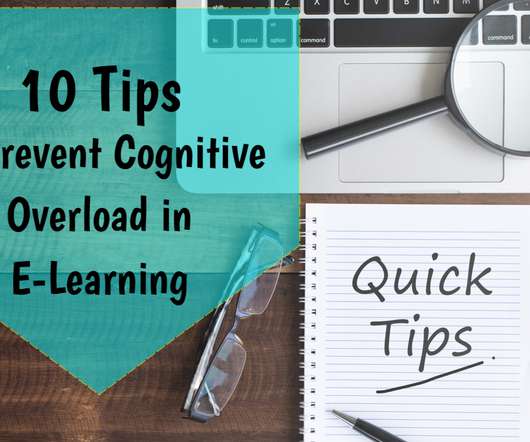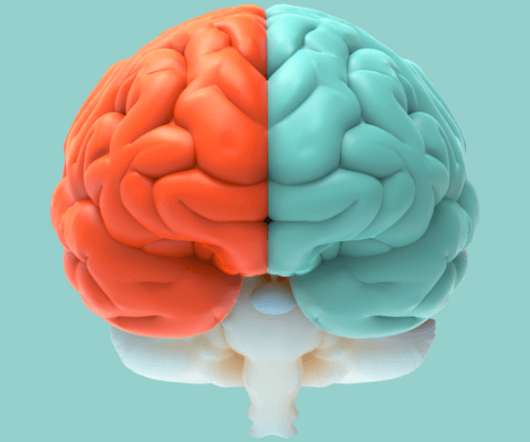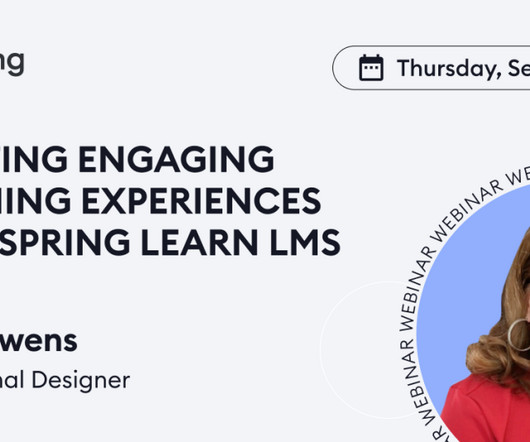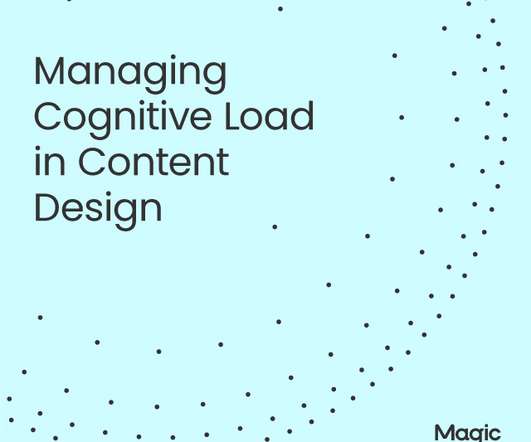3 Ways to Improve Your Training Programs with Cognitive Learning Theory Tools
BizLibrary
FEBRUARY 21, 2024
What is Cognitive Learning Theory? Cognitive learning theory (CLT) is a psychological perspective focused on the way our brains learn best.
This site uses cookies to improve your experience. By viewing our content, you are accepting the use of cookies. To help us insure we adhere to various privacy regulations, please select your country/region of residence. If you do not select a country we will assume you are from the United States. View our privacy policy and terms of use.

BizLibrary
FEBRUARY 21, 2024
What is Cognitive Learning Theory? Cognitive learning theory (CLT) is a psychological perspective focused on the way our brains learn best.

Adobe Captivate
JANUARY 17, 2017
In this post, I’d like to focus our attention on the theory side of things. However, one topic that Jim has helped me to better understand is that of cognitive load. There has been a great deal of research done on the topic, but in a nutshell, it refers to the amount of information the human brain can effectively process at one time.
This site is protected by reCAPTCHA and the Google Privacy Policy and Terms of Service apply.

Origin Learning
OCTOBER 15, 2014
What is cognitive load theory (CLT)? Attributable to John Sweller who developed this theory after thoroughly studying problem solving, CLT provides guidelines for improving learning and retention by focusing on the memory capacity of human beings. This is what a schema does: it helps in shedding some of the cognitive load.

Learningtogo
NOVEMBER 21, 2022
The Great Resignation: What Cognitive Science Can Help You Do About It. But the brain is a funny thing. Cognitive Load and the Toxicity of Busyness. John Sweller and colleagues established the theory of cognitive load in 1998. by Margie Meacham. In just the month of December 2021, about 4.3 BrainyBot™.

Advertisement
Cognitive science theories already supply the answers. Learner engagement and retention doesn’t have to be a mystery. Learn how OttoLearn packages them into a single platform you can use to deliver microlearning based reinforcement training, and go beyond completions to focus on outcomes.

Learningtogo
FEBRUARY 16, 2017
This is an example of what we call “cognitive overload.”. Cognitive Load Theory was introduced by John Sweller to explain why people have so much more difficulty learning complex content. Aerospace companies, for example, consider cognitive load when they design airplane and spaceship control panels.

Dashe & Thomson
MARCH 14, 2019
What Are Cognitive Biases? Our brains receive non-stop input from all five senses every moment we are awake. In the face of this enormous amount of daily input, our brains develop subconscious coping mechanisms that we can use to quickly make daily decisions. Cognitive biases result when these coping mechanisms fail.

Capytech
OCTOBER 7, 2021
10 Tips to Prevent Cognitive Overload in E-Learning. In a previous blog, we explained cognitive load theory and looked at ways to identify if cognitive overload is a problem in your existing e-learning courses. Preventing Cognitive Overload from Occurring When Designing New E-Learning Courses. Focus on the Topic.

eLearning Industry
APRIL 16, 2021
Cognitive load theory explains why it’s important to give employees exactly what they can handle, in a format that makes sense, so that they can learn, retain, and make use of the training. Here’s your guide to cognitive load theory and why it's so incredibly important to employee learning.

Infopro Learning
MAY 19, 2022
Include real-life scenarios and cognitive theories so that the learners can associate themselves with the facts and situations. Besides, easy-to-understand language and breaking up the modules into small chapters make it easy to learn the concepts and retain the same in their brains for a long time.

Mike Taylor
SEPTEMBER 1, 2023
Learn more → From Brain to Business: Crafting Content That Captivates and Converts In this webinar “From Brain to Business: Crafting Content that Captivates and Converts,” Dr. Drawing from her recent studies, she presents a practical 10-point checklist that aids in crafting content that not only stands out but also drives results.

Learningtogo
JANUARY 17, 2023
Nearly everything we thought we knew about the human brain changed when we started putting live subjects into functional Magnetic Resonance Imaging machines (MRIs) about 15 years ago. Cognitive science is a branch of psychology that attempts to explain human behavior by understanding how we think.

Ed App
JULY 10, 2019
Cognitive dissonance is a psychological term referring to the mental incompatibility between two or more beliefs. Cognitive dissonance, a form of psychological stress, commonly occurs in the learning process when new knowledge is given to learners with the expectation of a complete grasp of course content. Yep, she actually exists.

Magic EdTech
DECEMBER 22, 2021
Cognitive load theory in Instructional Design comes to the rescue. The theory was proposed by John Sweller in 1988 and is built on the way the human mind processes information. The theory was proposed by John Sweller in 1988 and is built on the way the human mind processes information. Sounds very familiar, right?

Mike Taylor
JULY 14, 2023
Cognitive load is influenced by motivation, task elements, and background knowledge. Cognitive load is influenced by motivation, task elements, and background knowledge. It has three types: intrinsic, extraneous, and germane load. Intrinsic load is about the task itself. Extraneous load is about the task’s design or environment.

eLearning Industry
MAY 22, 2019
Reducing cognitive load can make all the difference when designing great digital learning content. But, given the fact that most of us don’t have a degree in psychology, what exactly does cognitive load mean, and how can it be reduced? This post was first published on eLearning Industry.

Magic EdTech
FEBRUARY 16, 2021
Cognitive load theory, Instructional Design theory comes to the rescue, it prescribes a scientific way to design learning materials at a pace and level of complexity that the learner can fully understand. The theory was proposed by John Sweller in 1988 and is built on the way the human mind processes information.

Ontuitive
AUGUST 5, 2016
How Edward Tolman's experiments shaped our theories of learning. Edward Tolman's influential experiments with rats in the 1940's remain highly formative for the field of cognitive psychology, and continue to shape our discussions about learning theory.

Mindflash
NOVEMBER 6, 2019
And the human brain can only process a few pieces of information at a time. In psychology, this concept is known as Cognitive Load Theory. In this article, you’ll learn what this theory entails and how you can create a training program that doesn’t overwhelm your employees.

Clark Quinn
NOVEMBER 23, 2021
I’ve long maintained that our organizational practices are too often misaligned with how our brains really work. Yet, I realize that there may be another legacy, a cognitive one. The cognitive approach is certainly more recent than the Industrial Age, but it carries its own legacies. The premise comes from business.

eLearning Industry
MAY 10, 2019
Let’s take a closer look at 7 common causes of cognitive overwhelm that every eLearning pro should know about. There’s only so much a mind can take before it starts to overload and block incoming facts and stats. This post was first published on eLearning Industry.

Dashe & Thomson
FEBRUARY 4, 2014
After all, it’s best if the learner can focus on the learning event rather than on trying to interpret and decipher the meaning… Continue Reading The post Strain the Brain for Better Results appeared first on Social Learning Blog. Learning Style Theory Cognitive Strain CRT elearning instructional design Learning Theory'

CLO Magazine
SEPTEMBER 5, 2023
As someone with a background in cognitive science, I’ve always been fascinated by how people think, learn and adapt. That’s why I often ask people, “How does your brain work? ” The most common response I get is, “I don’t really know how my brain works.”

E-Learning Provocateur
JANUARY 12, 2010
Academia is teeming with learning theories. It can be quite a challenge for the modern learning professional to identify an appropriate learning theory, draw practical ideas from it, and apply it to their daily work. Which theory do you choose? How does it relate to other theories? Where do you start? Overarching themes.

Ed App
JULY 9, 2019
Cognitive overload brings disadvantage to employee training processes as learning capability is restricted, a potential detriment to the performance of employees. The cognitive overload theory is described as the occurrence of the brain being fed too much new information within a period of time, to the point where nothing can be absorbed.

Learningtogo
MAY 27, 2016
Your brain uses these new sensations to build new neural pathways, and the break from routine stimulates higher, more creative thought while it reduces stress. Here are some books you can get right from the ATD store: The Brain-Friendly Workplace by Erika Garms. Memory and Cognition in Learning by Jonathan Halls.

Ed App
NOVEMBER 5, 2019
WHAT IS COGNITIVE OVERLOAD? Firstly, what is cognitive overload? Cognitive overload is based on cognitive load theory, a theory within educational psychology and information processing. SO HOW CAN I EASILY REDUCE MY LEARNER’S COGNITIVE LOAD? Schemas are where we went our learning content to end up.

KnowledgeOne
JULY 7, 2022
The term “neuroscience” dates back to the 1960s and refers to the scientific study of the nervous system, from molecules to cognitive and behavioural functions. Note that the nervous system includes our fascinating brain. A) It has been confirmed that the brain can evolve and adapt throughout life. CORRECT ANSWER.

Thinkdom
FEBRUARY 29, 2024
Learning is a complex process influenced by a variety of cognitive, emotional, and environmental factors. Dual Coding Theory: The dual coding theory states that the understanding and memory of information are much better when it is presented verbally and visually.

Ed App
FEBRUARY 5, 2020
Cognitive dissonance, to put it in simple words, is the conflict or tension we feel when we hold two opposing views in our minds at the same time. However, microlearning research is used to counter the effects of cognitive dissonance. Microlearning Research. Change Beliefs. Change Actions. Change Perception Of Actions.

Saffron Interactive
NOVEMBER 15, 2019
Why are workers struggling with cognitive overload? Let’s start with the background of why cognitive overload has crept up on us. From your actions being recorded and processed by a computer brain, to the sheer know-how we need to acquire to stay on top of the digital output that is being produced. But they’re wrong.

Mike Taylor
DECEMBER 5, 2023
A Tale of Cognitive Overload Your learners’ brains are not infinite vessels; they have a limit on how much they can process at a given time, a concept explored by cognitive load theory. The trick is to use images that serve as cognitive aids and are directly relevant to the material at hand. Build wisely.

eLearning Industry
AUGUST 25, 2018
In this article, I’ll share 7 facts about cognitive overload that you should commit to memory. Are you overwhelming online learners with too many facts and figures? This post was first published on eLearning Industry.

HexaLearn
JANUARY 17, 2024
The Psychology Behind Effective eLearning: Comprehending The Mechanics Have you ever pondered how your brain processes information when absorbing something new? This is where cognitive psychology takes center stage in eLearning services. Building On Learning Theories Learning theories serve as guiding stars in eLearning.

Hurix Digital
FEBRUARY 26, 2024
The Science behind Playing and Learning Learning: Cognitive Engagement and Neural Activation Gaming: Enhanced Engagement and Reward Systems Integration and Overlap 3. Learning: Cognitive Engagement and Neural Activation When we learn something new, two main parts of our brain get busy. Table of Contents: 1.

KnowledgeOne
AUGUST 18, 2022
In the brain, all learning results from repeated activation of neurons related to the targeted learning. A) This “feedback” step is crucial for learning because it sends a signal to the brain that helps encode the response. Terms: memorization , recharge , brain capacity , task. True or false? CORRECT ANSWER.

IT Training Department Blog
AUGUST 17, 2023
Nope, we’re here to talk about cognitive load theory which is essential to understand and always keep top of mind when building training. Understanding cognitive load theory thoroughly is essential for the effective design of corporate IT training programs. This is where cognitive load theory comes into play.

Learningtogo
AUGUST 27, 2019
Nearly everything we thought we knew about the human brain changed when we started putting live subjects into functional Magnetic Resonance Imaging machines (MRIs) about 15 years ago. Cognitive science is a branch of psychology that attempts to explain human behavior by understanding how we think.

Matrix
APRIL 29, 2021
Reading is good for the brain. Continuing our series about adult learning theories series that instructional designers should know before creating training courses, we’ll explore experiential learning today. The Theory of Experiential Learning. However, knowledge is not the same as being able to do something.

Matrix
APRIL 27, 2021
The theory of transformative learning has been developed by Jack Mezirow. ” moment is both cognitive and emotional. The cognitive system makes use of prior knowledge and experiences all the time. Faced with new challenges on the horizon, L&D professionals have to keep up with the latest adult learning theories.

Learning Visions
MAY 24, 2007
Thursday, May 24, 2007 Brain Plasticity & Cognitive Abilities Ive just read Richard Nantels post The Ultimate Pretest in which he talks about his interest in brain plasticity. Scientists are finding ways to change the brain through intellectual exercises. Havent yet read that brain plasticity book , but its on my list.

KnowledgeOne
FEBRUARY 22, 2024
This is the subject of one of the chapters in “Emotions, Learning, and the Brain: Exploring the Educational Implications of Affective Neuroscience” by Mary Helen Immordino-Yang, Associate Professor of Education, Psychology and Neuroscience. ” Emotional and social neuroscience on learning First, a word about neuroscience.

LearningGuild
AUGUST 2, 2010
A designer can avoid this by understanding cognitive load theory and memory; in particular, the concepts of working memory and long term memory. Here’s some applied theory you can put to work immediately!

LearnUpon
AUGUST 27, 2019
There are lots of learning theories out there, but they are not a one size fits all thing. Your learning & development team should investigate the different theories and decide which ones suit the type of training you need to deliver, and the company culture you’re creating . 7 popular corporate training learning theories to try.
Expert insights. Personalized for you.
Are you sure you want to cancel your subscriptions?


Let's personalize your content